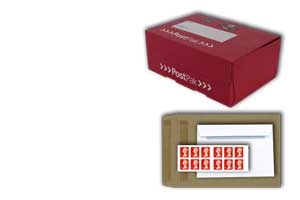 When sending items overseas it's important to know which service best meets your needs as well as checking whether the item you are sending is allowed in the destination country. You'll also find other helpful information here to ensure your item arrives quickly and safely.
When sending items overseas it's important to know which service best meets your needs as well as checking whether the item you are sending is allowed in the destination country. You'll also find other helpful information here to ensure your item arrives quickly and safely.
| Service | Compensation | Delivery aim | Weight up to |
|---|---|---|---|
|
International Tracked & Signed |
up to £50 up to £250 for an additional fee |
3-5 working days |
2kg Buy now |
|
International Tracked |
up to £50 up to £250 for an additional fee |
3-5 working days |
2kg Buy now |
| International Standard | up to £20 | 3-5 working days |
2kg Buy now |
| International Economy | up to £20 | 10-15 working days |
2kg Buy now |
If you are sending books and pamphlets the weight limit goes up to 5kg.
-
Delivery services
Main delivery services What’s available Delivery aim International Standard
Yes 3-5 working days Weight limit 2kg Books & pamphlets 5kg
Price zone: Europe
International Tracked and Signed Yes 3-5 working days Maximum compensation £250
International Tracked
Yes 3-5 working days Maximum compensation £250 International Signed No -
Addressing and packaging
General guidelines are available from P&T Luxembourg. The list below provides general advise on addressing an item:
- Align the address to the left-hand side of the envelope.
- The address consists of a maximum of six lines.
- Spacing between lines must be normal, do not leave too much space between two lines.
- Do not underline anything.
- Write the post code clearly.
- For less common numbering such as 6/8 rue des Bains, the recommendation is to use the first number, i.e. 6 rue des Bains.
Examples of Luxembourg addresses are provided:
Geographical address
Mr Jacques Muller
71, route de Berlin
L-1234 DUDELANGEPostal address
Société MJM
FAO: M. Jacques Muller
BP 1234
L-9874 REMICHInternational Tracked and Signed is delivered by GLS, a Royal Mail Group company where the name of the person signing for the item is available electronically at: https://gls-group.eu/EU/en/home and if you can place the recipient’s phone number on the address label then GLS will call them to arrange delivery, if required.
For further clarification, please refer to the useful information (new window) page on the P&T Luxembourg website
To help facilitate customs clearance, it is recommended that you provide recipient contact details (email address and/or phone number) so that recipients are contactable if any information is missing or incorrect. Contact details should be provided within the electronic customs data or in the case of a CN23 on the physical declaration. To ensure this information is protected do not write these contact details separately on the outside item.
-
Prohibitions
Here is an indication of prohibited items for mailing to Luxembourg. For further information, or further clarification please refer to the Luxembourg Post Office website
Please also refer to the Universal Postal Union - online prohibitions search tool

You must not send any item addressed to a country in which the item is unlawful or prohibited. When an item is restricted you must comply with the restriction. Prohibitions and restrictions vary from country to country, and can sometimes apply to items which you may think are ordinary. The information below is provided in good faith, but Royal Mail is not responsible for it, and it should be viewed as a guide only. Specific restrictions and changes may be enforced at short notice, so for clarification please contact the destination country's trade, postal, and customs authorities as appropriate. Business customers are strongly recommended to do this.
Please remember that Royal Mail also prohibits and restricts certain categories of items. For more information read our guidelines on international prohibited goods and international restricted goods
Prohibited items
Prohibited products are not permitted in the mail under any circumstances.
- Live animals
- All live animals except bees and honeycombs
- Meat and edible meat offal
- All meat: according to the nature and place of origin of these products, their importation is either prohibited or subject to regulation.
- All offal: according to the nature and place of origin of these products, their importation is either prohibited or subject to regulation.
- Fish and crustaceans, molluscs and other aquatic invertebrates
- Fresh fish and seafood: according to the nature and place of origin of these products, their importation is either prohibited or subject to regulation.
- Vegetable products
- Live trees and other plants; bulbs, roots and the like; cut flowers and ornamental foliage
- Live plants, flowering bulbs and cut flowers contaminated by parasites considered dangerous to crops.
- Cuttings and seedlings of the grape-vine (possible exceptions see below).
- Unrooted cuttings of poplars, seedlings of poplars (possible exceptions see below).
- Unrooted cuttings of chestnuts, seedlings of chestnuts.
- Cuttings, grafts and sets belonging to the genera Citrus, Fortunella and Poncirus.
- Prepared foodstuffs; beverages, spirits and vinegar; tobacco and manufactured tobacco substitutes
- Preparations of meat, of fish or of crustaceans, according to the nature and place of origin of these products, their importation is either prohibited or subject to regulation.
- Products of the chemical or allied industries
- Inorganic chemicals; organic or inorganic compounds of precious metals, of rare-earth metals, of radioactive elements or of isotopes
- Natural uranium and its compounds; alloys, dispersions (including cermets), ceramic products and mixtures containing natural uranium or natural uranium compounds.
- Used (irradiated) combustible components (cartridges) of nuclear reactors.
- Printed matter – relating wholly or in part to lotteries or sweepstakes not authorised in Luxembourg – simulating postage stamps, bank notes or other papers of value.
- Anonymous printed pamphlets not bearing the name of the printer.
- Arms and ammunition; parts and accessories thereof
- Weapons or other devices designed to harm individuals by means of tear gas or toxic, suffocating or inhibitory substances, and ammunition for them; arms and other devices intended to harm persons or property by fire or explosion, and ammunition for them; arms with blades having more than one cutting edge, bayonets, foils, swords, sabres, javelins, stylets and throwing knives; flick-knives; coshes, sword- and sabre-sticks.
-
Restrictions
Here is an indication of restricted items for mailing to Luxembourg. For further information, or further clarification please refer to the Luxembourg Post website
Please also refer to the Universal Postal Union - online prohibitions search tool

You must not send any item addressed to a country in which the item is unlawful or prohibited. When an item is restricted you must comply with the restriction. Prohibitions and restrictions vary from country to country, and can sometimes apply to items which you may think are ordinary. The information above is provided in good faith, but Royal Mail is not responsible for it, and it should be viewed as a guide only. Specific restrictions and changes may be enforced at short notice, so for clarification please contact the destination country's trade, postal, and customs authorities as appropriate. Business customers are strongly recommended to do this.
Please remember that Royal Mail also prohibits and restricts certain categories of items. For more information read our guidelines on international prohibited goods and international restricted goods
Restricted items
• Live animals; animal products
• Live animals
• Bees and honeycombs.
The following provisions are applicable for the importation of bees and honeycombs:(a) importation is upon presentation of a certificate, by batch of bees or by item, to the effect that the bees or honeycombs come from a hive which has been free from acariosis, nosemosis, foulbrood and varroasis and located outside a 3 km radius from where these diseases have been recorded for at least one year;
(b) items are checked by the veterinary official at the border inspection post on the basis of the certificate, the contents of which must meet the conditions stipulated in the import permit issued by the Ministry of Agriculture.
Importation by post may be only in packing which prevents any sting from these insects.
• All meat and all offal.
Products of animal origin intended for consumption by humans or by pet animalsOn importation, animal products must be accompanied by a certificate of origin and a health certificate or, where appropriate, of wholesomeness from a veterinary service in the exporting country. This certificate must be in conformity with the model established by the Community authorities.
Importation of the same products originating or coming from non-members of the European Economic Community is also subject to the presentation of a general or individual permit issued by the Veterinary Services Administration. No permit is required where the animal product imports are governed by Community provisions.
The importation of meat- and fish-based products is subject to the production of a certificate of wholesomeness issued by an official veterinarian of the exporting country. A list of countries or parts of countries from which the importation of the products is authorized has been drawn up by the Commission of the European Communities.
The above-mentioned provisions do not apply to meat-based products in small items addressed to private persons as long as such importation is not of a commercial nature and the quantity dispatched does not exceed 1 kg and provided that the items originate from a third country from which imports have not been prohibited for reasons of health policy.
• Fish and crustaceans, molluscs and other aquatic invertebrates
• All products. See All meat and all offal. Entry above
• Dairy produce; birds' eggs; natural honey; edible products of animal origin, not elsewhere specified or included
• Milk and dairy products. See Bees and honeycombs entry above
• Birds' eggs. See Bees and honeycombs entry above
• Natural honey. See Bees and honeycombs entry above
• Other products. See Bees and honeycombs entry above
• Products of animal origin, not elsewhere specified or included
• Products of endangered wild animals (ivory, rhinoceros horn).
Special provisionsIn the EEC, certain species of endangered wild fauna and flora are subject to the application of the Washington Convention.
In this respect, importation of these products is authorized on presentation of an import permit of the model attached as annex 2 and an export permit certifying that the specimen in question has not been obtained in contravention of the legislation on the conservation of fauna and flora in force in that State.
Import permits and re-export certificates are issued in the Grand Duchy of Luxembourg by the Ministry of Agriculture.
• Sperm of animals kept for breeding purposes.
• Vegetable products
• Live trees and other plants; bulbs, roots and the like; cut flowers and ornamental foliage
General noteThe general conditions for the importation of plants and plant products and their packing, which may harbour pests dangerous to crops, are laid down by the Agricultural Technical Services Administration, plant protection department.
These products must be examined on importation by an official responsible for phytosanitary protection and be accompanied by a plant health certificate issued in the country of origin and complying with the model in annex 1.
Special cases
The general phytosanitary control provisions are supplemented by special provisions relating to the prevention of the introduction of specified parasites such as San José scale.They consist of:
– prohibitions on importation of certain products from all or certain countries;
– the adoption of more restrictive measures (submission of a technical importation certificate);
– stricter entry provisions (compulsory disinsectization treatment conducted only at customs offices equipped with appropriate facilities (fumigation);
– measures relating to presentation and treatment of plants;
– the obligation for other products, sometimes solely on the basis of where they have come from, to be accompanied by phytosanitary certificates bearing certain extra details.Exceptions
The provisions concerning certification and control are not applicable for the importation of small quantities of: fresh fruit, cut flowers, parts of ornamental plants, potatoes, house plants, flower bulbs, on condition that these products are intended for use by the importer for non-commercial purposes.
Further information on the rules and prohibitions may be obtained from the Ministry of Agriculture, Agricultural Technical Services Administration.
• All plants, parts of plants, trees, bushes, flowering bulbs and cut flowers.
• Live plants and parts of live plants of the rosaceous family. Live plants, parts of live plants, trees, bushes, grafts and cuttings from countries contaminated with San José scale.
• Lac; gums, resins and other vegetable saps and extracts
• Opium.
Narcotics
The importation of narcotics, preparations and pharmaceutical specialities containing narcotics, medicines with toxic and hallucinogenic substances is subject to authorisation by the Ministry of Public Health.
• Preparations of meat, of fish or of crustaceans, molluscs or other aquatic invertebrates
• Meat-based products. See Bees and honeycombs entry above
• Products of the chemical or allied industries
• Organic chemicals
• Morphine.
• Cocaine, other narcotics
Narcotics
The importation of narcotics, preparations and pharmaceutical specialities containing narcotics, medicines with toxic and hallucinogenic substances is subject to authorization by the Ministry of Public Health.The importation of diacetylmorphine (heroin) is prohibited.
• Miscellaneous chemical products
• Anti-parasite products for agricultural use and similar products for retail sale.
• Arms and ammunition; parts and accessories thereof
Weapons and accessories subject to authorisation by the Ministry of JusticeAir pistols and air revolvers; pistols and revolvers designed to fire cartridges of inhibiting substances; pistols and revolvers for defensive and sports purposes; air rifles and guns; so-called sporting rifles and guns; military rifles and guns with operating characteristics and performance identical to sports and hunting weapons, or transformed into sports or hunting weapons; flick-knives specially designed for hunting; clubs; ammunition for the above weapons, silencers; cross-bows with a propulsive force greater than 10 kg.
-
More information
For more information about posting an item to Luxembourg please refer to the
Customs and Brexit
On 24 December 2020, the UK and the EU reached an agreement on how to trade (the Trade and Cooperation Agreement). It entered into force on 1 January 2021. As a result of the agreement, the UK is no longer part of the EU’s single market and customs union and new rules apply.
From 1 January, the UK has extended the rules which applied to non-EU postal items before. Similarly, the EU now treats postal items from the UK as it did non-EU items before. This means there may be changes to how you send and receive items from abroad.
For more information on how sending and receiving items to the EU may be impacted from 1 January, please click here.

How much will it cost?
Get a price for sending your postcard, letter or parcel overseas.
Search our help centre


Create and print
multiple labels with
Click & Drop


